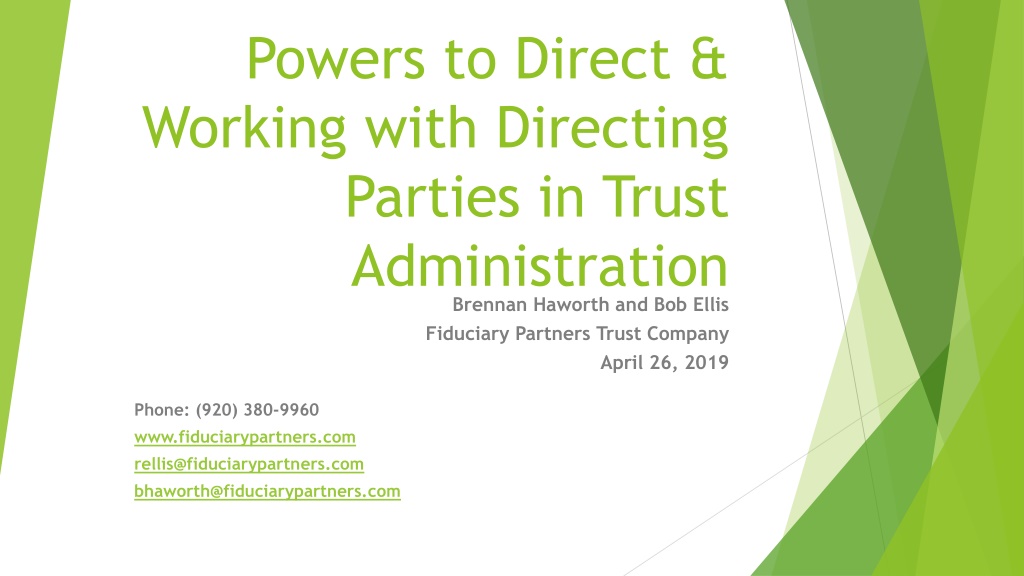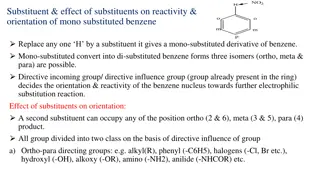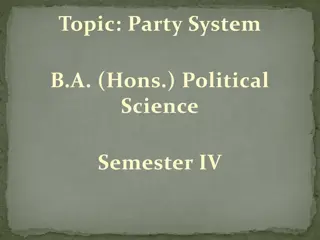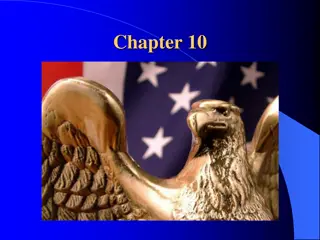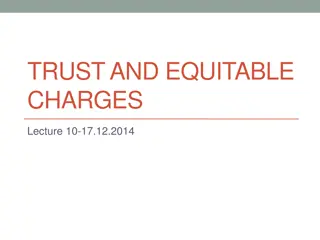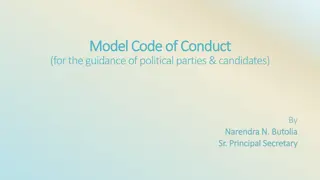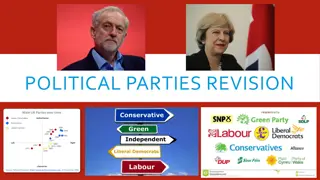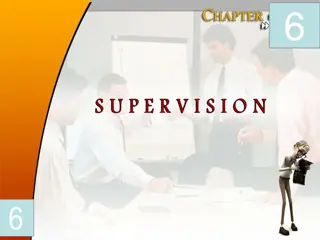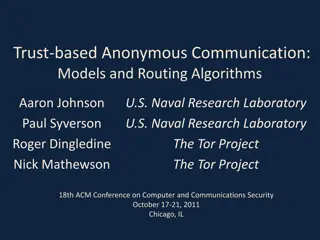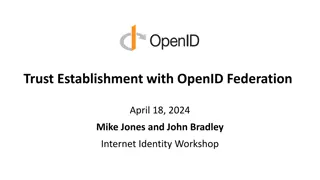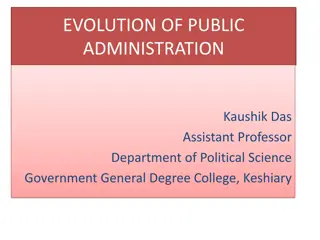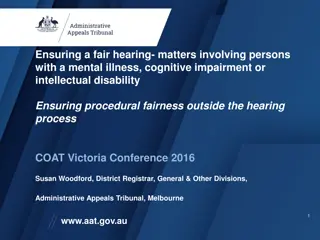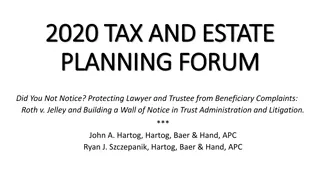Understanding Directing Parties in Trust Administration
Explore the role and impact of Directing Parties in trust administration, including their powers, responsibilities, and implications for trustees. Learn how Directing Parties influence investment decisions, distribution processes, and liability considerations within a trust. Gain insights into the appointment, selection, and historical context of Directing Parties in trusts. Discover the regulatory framework in Wisconsin and the legal implications for both trustees and Directing Parties.
Download Presentation

Please find below an Image/Link to download the presentation.
The content on the website is provided AS IS for your information and personal use only. It may not be sold, licensed, or shared on other websites without obtaining consent from the author. Download presentation by click this link. If you encounter any issues during the download, it is possible that the publisher has removed the file from their server.
E N D
Presentation Transcript
Powers to Direct & Working with Directing Parties in Trust Administration Brennan Haworth and Bob Ellis Fiduciary Partners Trust Company April 26, 2019 Phone: (920) 380-9960 www.fiduciarypartners.com rellis@fiduciarypartners.com bhaworth@fiduciarypartners.com
Overview 1. Trust without a Directing Party context for what a Directing Party allows 2. What is a Directing Party? 3. Reduction of Trustee s role and liability 4. Directing Parties for investments and for distributions 5. Choosing a Directing Party 6. How Directing Parties are appointed 7. Pre-July 1, 2014, Directing Party language 8. Alternatives and historical methods pre-July 1, 2014 9. Summary
1. Trust without a Directing Party context for what a Directing Party allows To understand how a Directing Party works with trustees, first, consider the typical model for trusts where trustees manage investments without Directing Parties. For investments, trustees are governed by: Wis. Stat. Chapter 881 Trust Fund Investments, the Uniform Prudent Investor Act. Requires the Fiduciary to invest and manage assets as a prudent investor would. Consider the purpose of the trust, the beneficiaries needs and other resources, and distribution requirements Trustees can delegate investment and management functions Selecting an agent, establishing scope of delegation, review agent s actions Agent owes a duty of reasonable care to comply with the terms of the delegation
2. What is a Directing Party? Wisconsin Trust Code is a modified version of the Uniform Trust Code as amended in 2005, and became effective July 1, 2014. Wisconsin Statute section 701.0103 defines Directing Party A person who, in a trust instrument or court order, is granted a power to direct a trustee s investment or distribution decisions or a power to make investment or distribution decisions regarding trust property and the power is granted to the person in a capacity other than as a trustee or trust protector. What does that mean? A Directing Party is a person who can direct the trustee on what assets to hold or can direct the trustee on distributions to beneficiaries With great power . . . Directing Parties are fiduciaries, and are required to act in good faith regarding the terms of the trust and the beneficiaries interests Wis. Stat. Chapter 881 Trust Fund Investments, the Uniform Prudent Investor Act. Requires the Fiduciary to invest and manage assets as a prudent investor would.
3. Reduction of Trustees role and liability When a Directing Party is appointed, a trustee does not have a duty to: Provide advice, monitor, or evaluate the Directing Party s conduct Inform or warn a beneficiary that the trustee disagrees with the Directing Party s actions Prevent a Directing Party from giving a direction or taking any action Compel a Directing Party to redress the Directing Party s actions or directions The trustee s administrative actions related to the scope of the Directing Party s power do not constitute monitoring or participating in the Directing Party s actions In the event of a breach of its duties, Directing Parties are liable for loss Trustees, if either acting or not acting according to the Directing Parties direction, are not liable, except for Trustees own willful misconduct
4. Directing Party for Investments The Trust Code gives us a new tool in Directing Parties to address client goals and concerns in their estate plans Increases flexibility for addressing some common planning issues Not a plug and play option; it needs to be well considered and personalized Trusts are created for many reasons, and they may include any type of assets The use of a Directing Party for investments can give the plan flexibility to deal with the different types of assets the trust may contain, and to address special objectives beyond prudent investor considerations Use of a Directing Party can reduce the trustee s risk associated with unusual assets or investment objectives, and may reduce trustee fees The Directing Party does not operate in a vacuum; the trust framework should address the grantors special objectives and wishes that motivate the use of a Directing Party, provide guidelines and protections for the Directing Party
4.1 When Directing Parties are used The Directing Party is linked to directed assets , which may be a portion of the entire trust; there may be more than one directing party for different groups of directed assets Special unique assets; exceptions to Prudent Investor rules Closely held business interests, LLCs, LLPs Assets with valuation concerns Real estate: Residence, cottage or recreation property, business or rental property Tangible personal property: jewelry, artwork, collections, firearms, equipment Alternative investments Concentration of securities, lack of diversification Life insurance Broadening the trust s investment management options Designate and lock in a trusted investment manager, or several managers Designate an investment strategy or approach, like index fund funds or robo- investment option Reduce trustee concerns regarding suitability, investment policy, investment oversight, etc.
4.2 Duties of a Directing Party for Assets From the Trust Code Direct the Trustee on retention, purchase, sale of property Direct the Trustee on management, control, and voting powers of property Select and determine the compensation for any outside investment advisors, consultants, and delegate authority to them under 881.01(10) Determine frequency and methodology of valuing property and provide value of property for which there is no readily available daily market value Note: Lack of a direction is a direction to not act
4.3 Directing Party for Distributions Gives direction to trustee for distributions to beneficiaries When a Directing Party for distributions may be used: special beneficiary or family concerns Beneficiary with special needs Alcohol or substance issues Incarcerated beneficiary Tax-motivated distributions More informed decision regular contact with beneficiary Keeps family involved without having family be trustee May be a committee or entity Directing Parties for distributions are not common
5. Choosing a Directing Party Any individual or entity may be named to can act as a Directing Party An individual family member or close friend Familiar with beneficiaries, special assets, but may lack objectivity Can create challenges for family relationships A professional advisor Can bring specialized knowledge of investments, familiarity with special circumstances and grantor wishes and investment approach Investment firm as Directing Party Many investment firms will not allow agents or firms to serve as directing party It is more common to name an individual with instruction to select and delegate to an investment manager or firm Selection of the Directing Party usually depends on the nature of the directed assets and the reasons for the Directed Party It is important that the Directing Party understand the trust s purpose and legal framework, and how to work with a trustee and beneficiaries; the Directing Party is held to a fiduciary standard, and should consider having legal representation
6. How Directing Parties are appointed Directing Parties may be appointed By the settlor in the trust Most often seen A court order By interested persons in a nonjudicial settlement agreement Drafting point Include language on how to remove, replace, and appoint a successor Directing Party, and language on the resignation of a Directing Party, especially with court order or nonjudicial settlement agreement
7. Pre-July 1, 2014, Directing Party language Example language of a Directing Party before statutory amendment While the Grantor is living and not unable to manage his affairs, the trustee shall make only such sales and investments as the Grantor directs After the death of the Grantor the majority of the descendants of the Grantor shall have all the powers of direction and delegation reserved to the Grantor hereunder. Any power of direction or delegation under this paragraph may be exercised only in a fiduciary capacity and for the benefit of the beneficiaries of the trust. While the Grantor or any other person or persons are empowered hereunder, the trustee shall be under no obligation to make any investment review or to consider the propriety of holding or selling any property of the trust. The statement of the trustee that it is acting according to this paragraph shall fully protect all persons dealing with the trustee. The trustee shall have no responsibility for any loss that may result from acting in accordance with this paragraph. From trust drafted in 1982
8. Alternatives and historical methods pre-July 1, 2014 Assets Draft hold language in trust that states: What assets (or what investment manager to use) are to be held in trust, without duty to diversify, and trustee has no liability for action or inaction by trustee regarding these assets Note, however, that this language may still be challenged by an unhappy beneficiary for failure to diversity or for failure to be rid of asset that causes harm. Hold language may not offer as much protection to trustee as a Directing Party can offer. Distributions Draft language in trust that states: Who trustee should consult with, but, that trustee s decision is binding Allows trustee to share information about the trust and the beneficiary with the consultant The Directing Party statute gives clarity as to Trustee s duties. In contrast, by not using a Directing Party, unless the trust is drafted to address the trustee s duties, there may be uncertainty as to the trustee s duties. In the absence of specific language directing the trustee, the trustee can still delegate investment management responsibility
9. Summary Directing party a person who is granted a power, in a capacity other than as a trustee or a trust protector, to make or to direct the trustee to make investment and distribution decisions. A directing party is a fiduciary and is obligated to act in good faith, consistent with the terms and purposes of the trust, and the interests of the beneficiaries. A trustee has no duty to monitor the directing party, and a trustee who follows a directing party's directions is not liable for any resulting losses, unless the loss is a result of the trustee's willful misconduct. Analysis by the Legislative Reference Bureau, Senate Bill 384, 2013-2014
